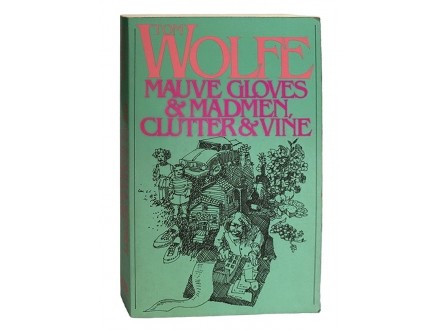Tom Wolfe - Mauve Gloves and Madmen, Clutter and Vine
| Cena: |
| Želi ovaj predmet: | 1 |
| Stanje: | Polovan bez oštećenja |
| Garancija: | Ne |
| Isporuka: | Pošta CC paket (Pošta) Post Express |
| Plaćanje: | Tekući račun (pre slanja) |
| Grad: |
Novi Sad, Novi Sad |
ISBN: Ostalo
Godina izdanja: 1988
Jezik: Engleski
Autor: Strani
U dobrom stanju
Paperback: 243 pages
Publisher: Farrar Straus & Giroux; Reissue edition (April 1988)
Language: English
ISBN-10: 0374520925
ISBN-13: 978-0374520922
Product Dimensions: 5.2 x 0.7 x 8.3 inches
Mauve Gloves & Madmen, Clutter & Vine was Wolfe`s third collection of essays and short stories, following The Kandy-Kolored Tangerine-Flake Streamline Baby in 1965 and The Pump House Gang in 1968. Wolfe`s 1970 book Radical Chic & Mau-Mauing the Flak Catchers contained two lengthy essays and is not generally considered a collection.[2] Mauve Gloves & Madmen, Clutter & Vine was published in 1976 by Wolfe`s regular publisher Farrar, Straus & Giroux.
In Mauve Gloves, Wolfe wrote about subjects that had been widely covered before and sought to bring his unique insight to old stories, rather than tell wholly original stories about unexplored subcultures.
The primary theme of Wolfe`s essays is the struggle for social status. Wolfe is particularly critical of the intelligentsia and the liberal elite, themes that he had previously explored in Radical Chic & Mau-Mauing the Flak Catchers. His contempt for distinguished writers (which would later be manifested in a feud with many of his contemporaries, particularly John Updike) was evident in an essay about an established West Side author discussing his cash flow at length.[4] Wolfe continued to denounce what he saw as faux-sympathy for poor people coming from a rich liberal elite.
Wolfe terms the status-driven era he chronicled the "Me` Decade,` and suggests that the wealth of the Post-War era is responsible for the self-absorption of the 1970s. Wolfe declared that people had given up on `man`s age-old belief in serial immortality,` the notion that people lived on through ancestral tradition and self-sacrifice, and instead focused only on themselves.
The longest essay, however, is `The Truest Sport: Jousting with Sam and Charlie,` about life aboard an aircraft carrier in the Gulf of Tonkin in 1967. Wolfe writes about the personnel of the aircraft in heroic terms. According to The New York Review of Books, another common theme throughout all the books is the effect the Vietnam War had on American society.
The lone short story in the book, `The Commercial` is an essay of a black baseball player who is given an advertising deal. Initially, the athlete believes the commercial will help establish him as more than a black athlete, but instead the advertisers want him to mispronounce words, thus dehumanizing him despite his success.
Writing
Often referred to as New Journalism, Wolfe`s characteristic writing style, characterized by florid prose and obsessive attention to detail, are on display throughout the book.
Wolfe compared himself to British author Evelyn Waugh, who was known for his dark comedy. The New York Times however, suggested that Wolfe`s latest effort most closely resembled the French author Louis-Ferdinand Céline, who in the early 20th century, wrote in a highly colloquial style, and delved deeply into the anxieties of his characters. Because Wolfe`s subjects in Mauve Gloves were not people on the fringes of society, the New York Times critic argued that Wolfe had begun to rely more heavily on `writing qua writing,` and less on the inherent zaniness of his subjects.
In one of the book`s most famous passages in the essay `The `Me` Decade and the Third Great Awakening`, exemplifying his style of description, Wolfe called Jimmy Carter a `Missionary lectern-pounding Amen ten-finger C-major-chord Sister-Martha-at-the-Yamaha-keyboard loblolly piney-woods Baptist.`134
L_I_Č_N_O______P_R_E_U_Z_I_M_A_NJ_E_:
Za kupovine ukupne vrednosti preko 3.000 dinara moguće lično preuzimanje u Puškinovoj u Novom Sadu. Ako je za pojedinačnu knjigu navedena samo opcija Pošta, lično preuzimanje samo te knjige nije moguće. U Novom Sadu moguća je lična dostava i plaćanje preko službe Eko-kurir (cena je 250-350 din).
STANJE KNJIGE:
Knjiga koju dobijate je ona koja je na slici. Ukoliko nije naznačeno da je knjiga nova ili nekorišćena, ponekad se desi da na predlistu stoji potpis, posveta ili pečat i da to nije navedeno u opisu. Ako vam takve stvari smetaju, pitajte me pre kupovine da proverim.
KOMUNIKACIJA:
Komunikacija ide isključivo preko Kupindo poruka, ne telefonom. Budite normalni.
POPUSTI, CENKANJE I SL.:
Cena je ta koja piše, molim vas da mi ne šaljete pitanja o poslednjoj i zadnjoj ceni niti svoje kontraponude.
SLANJE:
Knjige šaljem kao tiskovinu ili CC paket nakon uplate na račun. Pakujem ih bezbedno i pažljivo, dobijate ih u stanju u kojem su poslate. Poštarina za jednu pošiljku obično iznosi od 190 do 260 din, u zavisnosti od težine. To je poštarina za tiskovinu, CC paket je skuplji, post ekspres je najskuplji. Za četiri i više pojedinačno kupljenih knjiga (u to ne spadaju kompleti) ja snosim troškove poštarine. Potrebno je da uplatite/preuzmete knjigu u propisanom roku od 7 dana.
SUSEDNE ZEMLJE I INOSTRANSTVO:
Poštarina je za jednu knjigu visoka i okvirno se kreće od 10-15 eur za prvu i oko 7 eura za svaku dodatnu knjigu. Postoji mogućnost znatno isplativijeg slanja za teže pakete. Uplate PayPalom (+10%), direktno na devizni račun, Western Union ili Moneygram. Najbolje je da pre kupovine pitate koliki su troškovi dostave, jer su često veći od cene same knjige.
INTERNATIONAL ORDERS:
I will send abroad. For your calculation, one hundred dinars roughly equals $1. Please register here:
https://www.limundo.com/Registracija/Kupindo
and then PM me on the link below for postage costs (they usually start at around 15 euro for the first book and 7 euro for each additional one)
https://www.kupindo.com/Clan/ndi/PostaviPitanje
MOJA PONUDA:
Nove knjige postavljam gotovo svaki dan. Možete ih pratiti na ovom linku http://www.limundo.com/Clan/ndi (pritisnite dugme `Prati`)
¤¤¤¤¤¤¤¤¤¤¤¤¤¤¤¤¤¤¤¤¤¤¤¤¤¤¤¤¤¤¤¤¤¤¤¤¤¤¤¤¤¤¤¤¤¤¤¤¤¤¤¤¤¤¤¤¤¤¤¤¤¤¤¤¤¤¤¤¤¤¤¤¤¤¤¤¤¤¤¤¤¤¤¤
Predmet: 76834337







